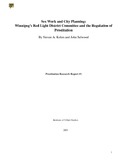| dc.description.abstract | In November of 1999, a Manitoba Provincial Court decision called into question the City of Winnipeg’s ability to regulate off-street prostitution through its municipal licencing by-law for escort services. The result was a lengthy process that saw the city establish a volunteer committee to investigate the regulation of the sex trade in Winnipeg and make recommendations about what could be done in the future. This paper examines the process by which the volunteer committee arrived at its recommendations, and the resulting response from city bureaucrats and officials within the provincial Department of Justice. In the end, most of the committee’s recommendations did not result in any concrete action by the city or province, and perhaps the most significant one – the creation of a new city by-law to regulate the industry – is, nearly two years later, still in the planning phase. In the meantime, the province has put into place a tough new law to deal with the sex and drug trade. At present, the city has yet to address the key concern of the court decision that began the process over three years ago: the development of a clear set of regulations for an industry badly in need of closer monitoring and supervision. | en_US |

